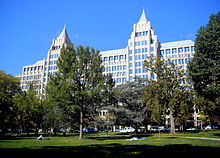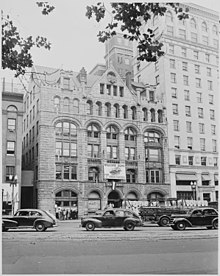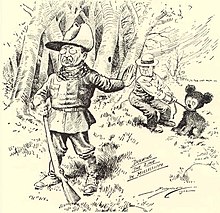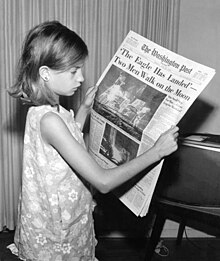The Washington Post
| The Washington Post | |
|---|---|
|
|
|
| description | American daily newspaper |
| language | English |
| publishing company | Nash Holdings LLC ( United States ) |
| Headquarters | 1301 K Street NW, Washington, DC |
| First edition | December 6, 1877 |
| founder | Stilson Hutchins |
| Frequency of publication | Every day |
| Sold edition | weekdays 254,379 (2019), Sundays approx. 600,000 (2012) copies |
|
( Top 10 US Daily Newspapers ABC ) |
|
| Editor-in-chief | Martin Baron |
| editor | Fred Ryan |
| Web link | www.washingtonpost.com |
| ISSN (print) | 0190-8286 |
The Washington Post is the largest daily newspaper in Washington, DC , the capital and seat of government of the United States . The "Post" was founded in 1877; it is thus the oldest newspaper still published in Washington, a metropolitan area with over 8 million inhabitants. She was part of the Washington Post Company until 2013 . On August 5, 2013, the sale of the newspaper to Amazon founder Jeff Bezos was announced. The editor-in-chief is Martin Baron (as of July 2020). The Washington Post's motto for its online presence is: Democracy Dies in Darkness (English for "Democracy dies in the dark")
history
Start time
The Washington Post first appeared on December 6, 1877 with an edition of ten thousand copies and had a total of four pages. The founder of the newspaper was the journalist Stilson Hutchins (1838–1912); he had been a member of the Missouri House of Representatives for the Democratic Party since 1866 .
The early writers included Theodore Roosevelt , who later became President of the United States .
The newspaper was sold to Republican Frank Hatton in 1889 and took a more conservative course. In 1905 John Roll McLean bought the post office , who like founder Hutchins was close to the Democrats. With McLean, the newspaper experienced an upswing in circulation and advertising revenues. This only changed when after his death in 1916 the son Edward Beale McLean, known as Ned, took over the newspaper, who led the life of a playboy. The deteriorating financial situation finally found its nadir in the auction of the sheet 1933 (1929 had global economic crisis started; it was followed in the US, the Great Depression that lasted until the late 1930s).
After the 1933 auction
At the auction of the newspaper, the Californian banker Eugene Meyer got the chance; under his aegis, the Post developed into a profitable company again. After the Second World War, over 160,000 copies appeared daily. His son-in-law Philip Graham eventually took over the management of the newspaper with his wife Katharine Graham ; he was able to build on a grown team of good journalists. Katharine Graham began her career in the group as a journalist in 1939 and, after her husband's suicide in 1963, built it up into a media empire that included radio and TV stations as well as daily newspapers and magazines . In 1954, she acquired the Washington Times-Herald, which appeared in a larger circulation in Washington as the morning paper (emerged from the merger of the Washington newspapers Times and Herald). After the merger, the newspaper initially appeared under both names; the Times-Herald title shrank and eventually disappeared entirely. In 1960, the Washington Post Company also took over the New York magazine News-Week (later: Newsweek ).
The Post's reputation as a national newspaper with experience in investigative journalism dates back to the early 1970s. In 1971 the Post published the Pentagon Papers , which documented deceptions and misjudgments in the Vietnam War . The Post supported the New York Times , which had started printing a few days earlier, in its fight against US President Richard Nixon . The New York Times had previously been banned by a federal judge at the efforts of the federal government from printing further parts of the Pentagon papers, which was the first time in the history of the United States that a newspaper was banned from publication. Both newspapers took the case to the United States Supreme Court and won a landmark ruling on freedom of the press .
The following year, the Watergate scandal was uncovered from June 1972 by the two Post reporters Bob Woodward and Carl Bernstein . Based on a series of smaller articles about conspicuous connections in the presidential election campaign, Woodward and Bernstein were able to gain the trust of a whistleblower known as Deep Throat . He provided them with information from the FBI and thus supported their research, according to which Nixon and his team, among other things, illegally used government agencies, manipulated campaign finances, used illegal methods in the election campaign and obstructed the investigations of the judiciary. The following year the newspaper was awarded the Pulitzer Prize in the category of public service for investigative research by Woodward and Bernstein .
Warren Buffett joined in 1973
In 1973, investor Warren Buffett took a 10% stake in the post and took over the management of the supervisory board until his retirement in 2011. The newspaper continued to do well.
Together with the New York Times, the “Post” published the worldwide “ International Herald Tribune ”. On December 30, 2002, the New York Times Company took over the shares in "Post"; since then she has edited the “Tribune” alone.
From 2006 to 2007 the newspaper was involved in the Washington radio market. The Washington Post Radio (WPR) as a radio program from Bonneville Broadcasting and the Washington Post was intended to form a commercial version of National Public Radio . The program was transmitted on MW 1500 kHz from WTOP . However, the attempt lasted only one year, then WPR was replaced by other program formats.
In 2010, the Post gave Newsweek for a symbolic dollar.
outlook
The economic development of the Washington Post suffers from the fact that it has a national distribution, but that its long-term majority owners are regionally oriented. Maintaining offices around the world was primarily a service for the regional readership that the newspaper could afford until, with the increasing spread of the Internet, its circulation fell into the six-figure range within a few years. The newspaper has laid off employees and closed off-site offices several times since 2003. At the end of 2009 , 700 editors remained in the newsroom (six years earlier there had been 900); Besides the headquarters there are only offices abroad. In Europe, the Washington Post office remained in London. The need for radical cuts was initially reduced because the Post acquired Kaplan, a company that operates private and for-profit colleges , in 1984 as part of a diversification strategy . Kaplan experienced a huge boom in the 1990s; For a long time it was possible to compensate for the losses of the Post in the company as a whole by profits of other parts of the company.
Change of ownership in 2013
From the end of 2012, the owner family seriously considered selling the property. On August 5, 2013, the Washington Post Company announced that the founder and president of the online mail order company Amazon , Jeff Bezos , bought the Washington Post as a private individual and separated it from the Washington Post Company. The purchase price was $ 250 million. The Washington Post Company with its subsidiaries Kaplan, StudentAdvisor.com, Slate Group, SocialCode, Post-Newsweek Stations, the newspapers The Gazette, Express, El Tiempo Latino etc. will continue to exist under a changed name without their previous “flagship”.
Bezos wrote a letter to the employees on the day of purchase in which he stated: “The values of 'Post' do not need any change. The newspaper will remain committed to its readers and not to the private interests of its owners ”and he“ has no intention of interfering with day-to-day business ”.
In an interview a few days later, he announced that he wanted to apply the same three approaches to the paper that had made Amazon great: customers first, innovation and patience. He would give the Washington Post the money it needed over a longer period of time so that management could try out how news spreading could be profitable.
Since the takeover by Bezos, Swiss Post has greatly expanded its team of software developers and optimized its offering specifically for mobile access. The company licenses the software written for this purpose to other media companies, thereby generating a completely new form of income. In a partner program, Swiss Post licenses its online edition free of charge to subscribers of 270 other newspapers (as of May 2015). This enables Swiss Post to obtain data on readers outside of its own subscribers and can also sell individualized online advertisements for these readers.
In the summer of 2015, the post office moved to Franklin Square on K Street.
Awards
The Washington Post received numerous awards as one of the most prestigious newspapers in the United States in its history. The most important journalism prize in the country, the Pulitzer Prize , which has been awarded since 1917 , she or journalists working for her received eight times in the category of foreign reporting and five times for a " service to the public ", including 1973 for the exposure of the Watergate affair and in 2014 collaborated with the Guardian for reporting on the NSA surveillance scandal .
Movie
The activities of the Washington Post provided the template for lavish cinema productions several times:
- Under the title All the President's Men (dt .: The Untouchables ) filmed Alan J. Pakula 1976, the events surrounding the investigation of the Watergate scandal by the Post editors Carl Bernstein and Bob Woodward with Dustin Hoffman and Robert Redford in the lead roles.
- 2017 turned Steven Spielberg the movie The Post (dt .: The publisher ), the publication of the Pentagon Papers is through the newspaper in the 1971st Meryl Streep plays Katharine Graham and Tom Hanks her editor-in-chief Ben Bradlee .
Trivia
In 1889, the newspaper hired United States Marine Band leader John Philip Sousa to compose a march. The Washington Post march premiered on June 15, 1889, as part of a children's essay contest sponsored by the newspaper.
literature
- Deborah Davis: Katharine the Great. Katharine Graham and Her Washington Post Empire , Sheridan Square Press, New York 1991, ISBN 0-941781-14-3 .
- Martin L. Fleming: Inside the Washington Post , Vintage Press, New York 1996, ISBN 0-533-11818-2 .
-
Katharine Graham : Personal History . Knopf, New York 1997, ISBN 0-394-58585-2 .
- We press! The head of the Washington Post tells the story of her life . Rowohlt, Reinbek 2001, ISBN 3-499-61199-6 ; New edition 2018 under the title The publisher: How the head of the Washington Post changed America (translation: Henning Thies). Rowohlt, Reinbek 2018, ISBN 978-3-499-63414-7 .
Web links
- www.washingtonpost.com
- mediadb.eu: Company portrait of the Washington Post Company at the Institute for Media and Communication Policy
Individual evidence
- ↑ Top 25 US Newspapers for September 2012. (No longer available online.) In: Alliance for Audited Media. Archived from the original on December 7, 2012 ; accessed on January 19, 2013 (English). Info: The archive link was inserted automatically and has not yet been checked. Please check the original and archive link according to the instructions and then remove this notice.
- ^ A b Paul Farhi: Washington Post to be sold to Jeff Bezos. In: The Washington Post online. August 5, 2013, accessed August 5, 2013 .
- ↑ Katharine Graham : The publisher: How the boss of the "Washington Post" changed America . Rowohlt, Reinbek 2018, p. 61.
- ^ Douglas O. Linder: The Daniel Ellsberg (Pentagon Papers) Trial: A Chronology. In: University of Missouri – Kansas City online. Retrieved January 19, 2013 .
- ^ Washington Post Radio Station to Debut in March. Retrieved November 29, 2016 .
- ^ The Washington Post Company: Washington Post Radio to Debut in March 2006. In: www.prnewswire.com. Retrieved November 29, 2016 .
- ^ Sarah Ellison: Ghosts in the Newsroom. In: Vanity Fair online. April 2012, accessed January 19, 2013 .
- ↑ Bill Carter: Washington Post to Shut US Bureaus. In: The New York Times online. November 24, 2009. Retrieved January 19, 2013 .
- ↑ Washington Post Foreign Bureaus. In: The Washington Post online. Retrieved January 19, 2013 .
- ^ The sale of The Washington Post: How the unthinkable choice became the clear path , Washington Post, Aug. 7, 2013
- ↑ Jeff Bezos: Washington Post sale leaves some anxiety over mogul's motives , The Guardian, Aug. 7, 2013
- ↑ Jeff Bezos: Jeff Bezos on Post Purchase. The Washington Post, August 5, 2013, accessed on August 6, 2013 (Bezos' letter to the Washington Post staff): “The values of The Post do not need changing. The paper's duty will remain to its readers and not to the private interests of its owners. ... I won't be leading The Washington Post day-to-day. "
- ↑ Washington Post: Jeffrey Bezos, Washington Post's next owner, aims for a new 'golden era' at the newspaper , September 2, 2013
- ^ Adrian Lobe: The "Washington Post" no longer wants to be a newspaper . Hamburger Abendblatt, January 28, 2015
- ^ The Economist: Exploring the Amazon , May 30, 2015
- ^ The Washington Post Company History . Retrieved August 5, 2013



